May 17, 2025 | 10:18 GMT +7
May 17, 2025 | 10:18 GMT +7
Hotline: 0913.378.918
May 17, 2025 | 10:18 GMT +7
Hotline: 0913.378.918
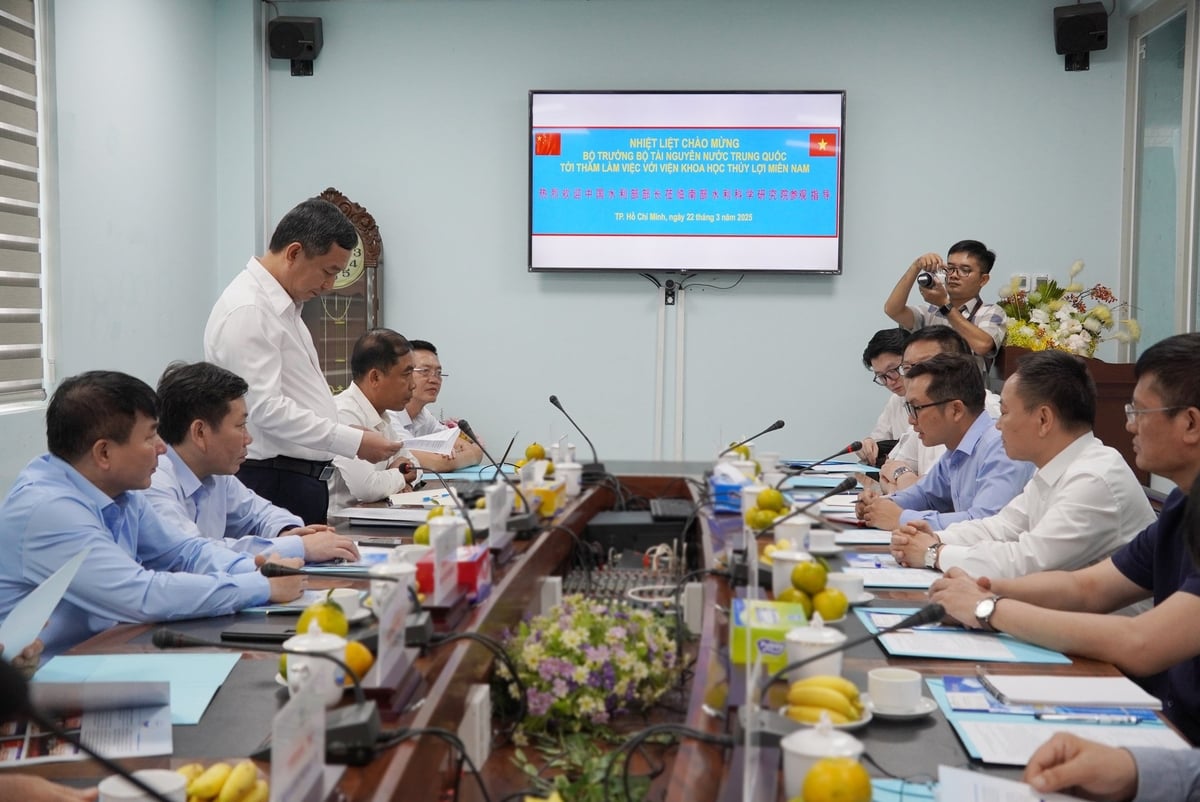
The working session between the Southern Institute of Water Resources Science and Technology and the delegation from Ministry of Water Resources the People's Republic of China. Photo: Nguyen Thuy.
The event took place as the two countries marked the 75th anniversary of diplomatic relations and prepared for the Vietnam-China Year of People-to-People Exchanges in 2025.
During the working session, Assoc. Prof. Dr. Tran Ba Hoang, Director of the Southern Institute of Water Resources Science and Technology, welcomed Minister Li Guoying and the delegation from Ministry of Water Resources the People's Republic of China. He also expressed his gratitude for their interest and valuable time spent on this working visit to Vietnam.
According to Assoc. Prof. Dr. Tran Ba Hoang, the Southern Institute of Water Resources Science and Technology operates under the Vietnam Academy for Water Resources (Ministry of Agriculture and Environment). Its mission is to conduct scientific research to support public services, participate in training, engage in international cooperation, provide consultancy, and transfer technology in the fields of irrigation, hydropower, environment, and disaster prevention.
Over nearly 50 years, the institute has achieved notable results, including research on water resource dynamics in the lower Mekong river aasin; water resource forecasting for the Mekong Delta; drought and saltwater intrusion forecasting and warning for the region; studies on riverbed morphology and the management of the Mekong river estuary system; and forecasting riverbank and coastal erosion in the Mekong Delta.
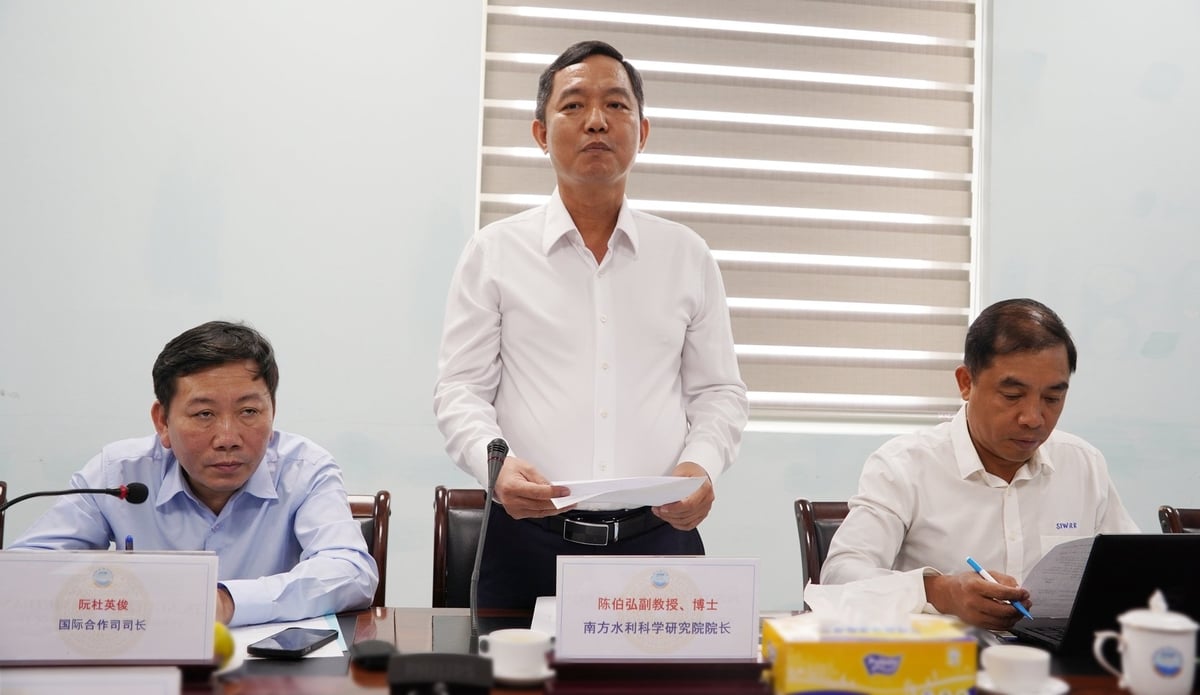
Assoc. Prof. Dr. Tran Ba Hoang, Director of the Southern Institute of Water Resources Science and Technology, speaks at the working session. Photo: Nguyen Thuy.
"These research findings have effectively supported management agencies and local communities in dealing with natural disasters, droughts, and saltwater intrusion, thereby minimizing damage and helping people adapt to climate change," said Assoc. Prof. Dr. Tran Ba Hoang.
Sharing insights with the delegation on the challenges of water resource management in the Mekong Delta, Assoc. Prof. Dr. Nguyen Nghia Hung, Deputy Director of the Southern Institute of Water Resources Science and Technology, pointed out that although the Mekong Delta accounts for only 5% of the Mekong river basin’s area, it receives up to 95% of its water from upstream. At the same time, the region is impacted by climate change, sea level rise, land subsidence, and sand mining, which disrupt the ecological balance.
'The Mekong Delta is facing three major challenges: from upstream, from the sea, and from internal issues within the delta. Each factor creates unpredictable changes, directly affecting agricultural production and the livelihoods of local communities,' Assoc. Prof. Dr. Nguyen Nghia Hung emphasized.
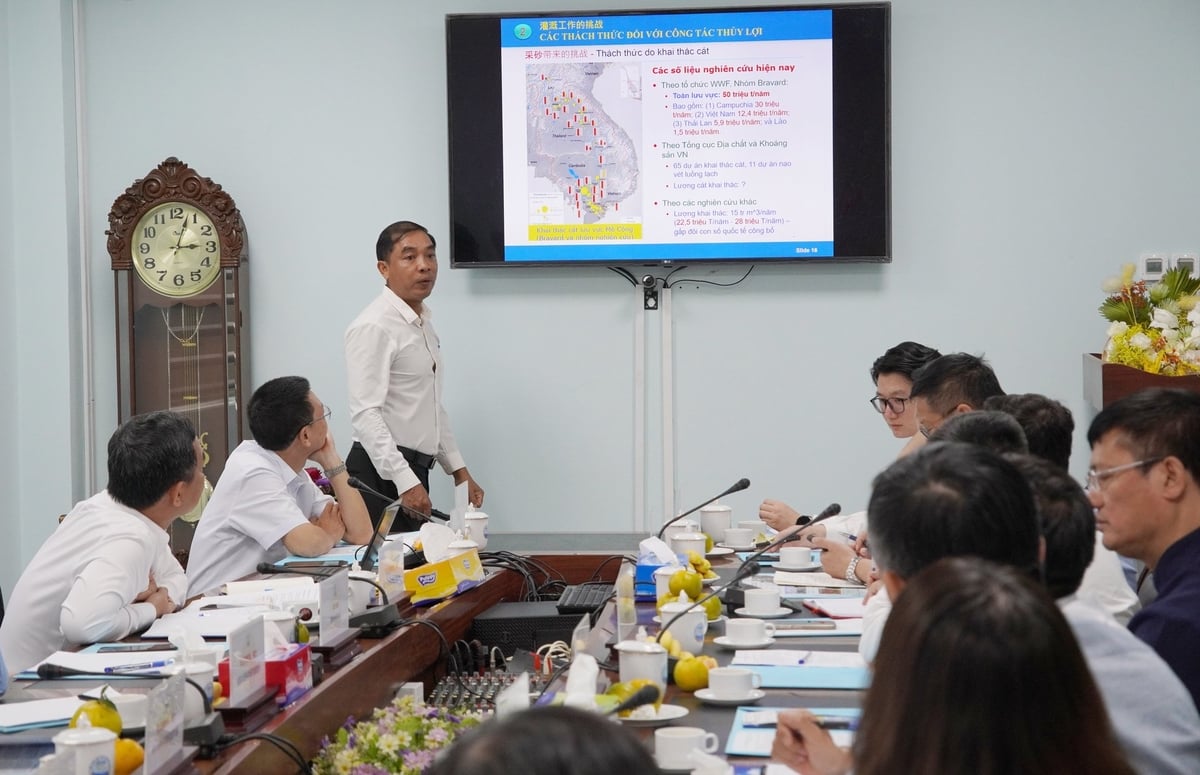
Assoc. Prof. Dr. Nguyen Nghia Hung, Deputy Director of the Southern Institute of Water Resources Science and Technology, shares insights on the challenges facing the Mekong Delta. Photo: Nguyen Thuy.
One of the most serious issues today is land subsidence, occurring at a rate of 1.5 to 3 cm per year - 7 to 8 times faster than sea level rise. This exacerbates the risks of flooding and saltwater intrusion during the dry season. Additionally, tidal surges, droughts, and saltwater intrusion are becoming increasingly severe, directly impacting crop yields and the livelihoods of people in the region.
Therefore, to adapt to the current situation, water resource management must focus on addressing the following issues: the shortage of sediment from upstream; increasingly severe and earlier saltwater intrusion due to rising tides; more frequent flooding in the delta; and the growing vulnerability of the region due to various natural disasters, including storms, floods, droughts, El Niño, La Niña, and climate change. Additionally, upstream developments have significant impacts on the delta.
For a long time, the Southern Institute of Water Resources Science and Technology has maintained cooperative relationships with Chinese institutions and universities, such as Hohai University, Wuhan Institute of Hydraulic and Electric Engineering, and the Nanjing Hydraulic Research Institute. Assoc. Prof. Dr. Tran Ba Hoang expressed his desire to further strengthen cooperation in science, technology, and training, especially as climate change continues to have a significant impact on water resource management in Vietnam.
The Southern Institute of Water Resources Science and Technology hopes to continue its cooperation with China in the following eight areas in the future: Capacity building in digital technology and data transformation for the entire Mekong river basin; developing comprehensive research programs on basin-wide changes and developments, climate change, and sea level rise; sharing and exchanging academic knowledge on river basin management, hydraulic infrastructure management, sediment and gravel management, and water resource management; exchanging experiences in developing integrated planning for urban space, agriculture, and modern industry; collaborating on science and technology related to environmentally friendly and cost-effective construction materials; and training personnel between both parties.
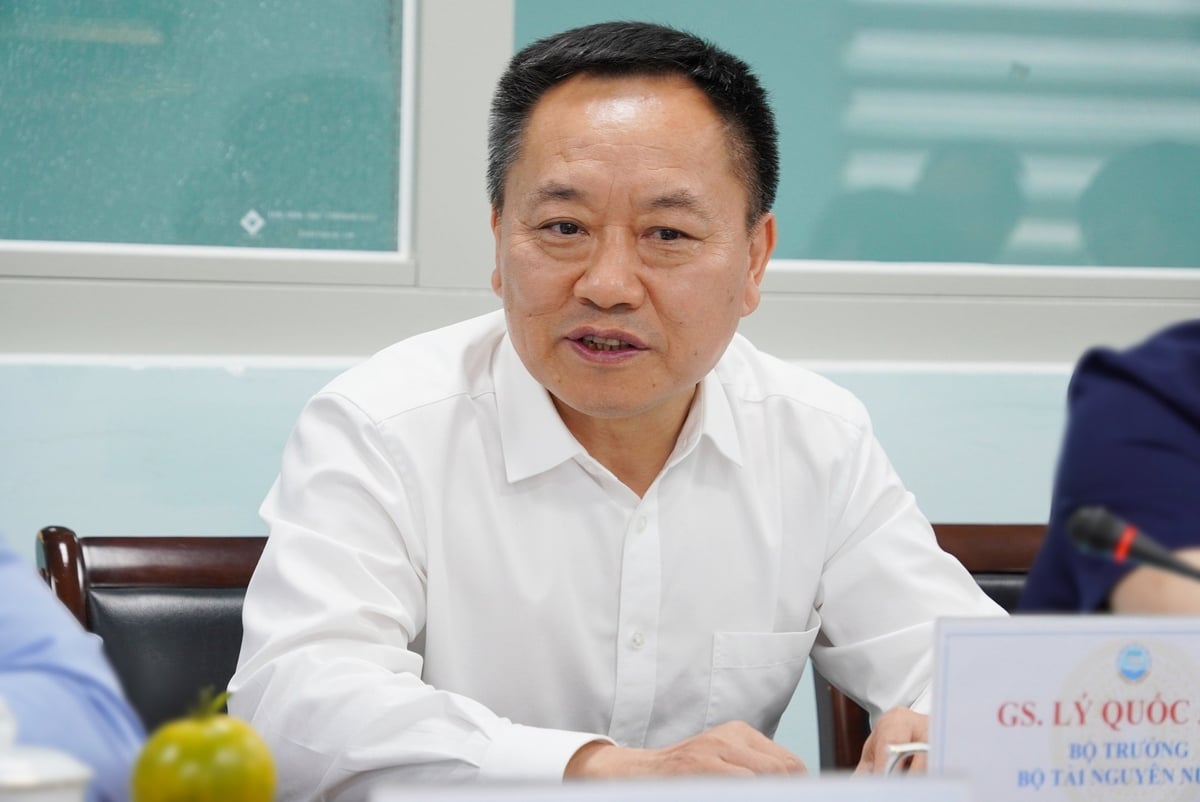
Professor Li Guoying, Minister of Water Resources the People's Republic of China, speaks at the meeting. Photo: Nguyen Thuy.
Professor Li Guoying, Minister of Water Resources the People's Republic of China, highly appreciated the research achievements of the Southern Institute of Water Resources Science and Technology in recent years. He also affirmed that China can share valuable experience in water resource management, particularly in addressing challenges such as riverbank and coastal erosion, as well as flooding. Minister Li Guoying further stated that China has conducted similar studies and is ready to collaborate in solving the issues facing the Mekong Delta.
"We highly value the current and future cooperation between the two countries, especially in areas such as forecasting technology, water resource management, and the sustainable development of hydraulic projects," Minister Li Guoying shared.
Assoc. Prof. Dr. Tran Ba Hoang expressed his hope that through close cooperation between the Southern Institute of Water Resources Science and Technology and Chinese partners, both sides will continue to develop scientific and technological solutions to address major challenges in water resource management in the Mekong Delta. Particularly, as climate change intensifies, sharing experiences, data, and adaptation solutions is crucial for protecting the environment, safeguarding livelihoods, and ensuring sustainable development in the region.
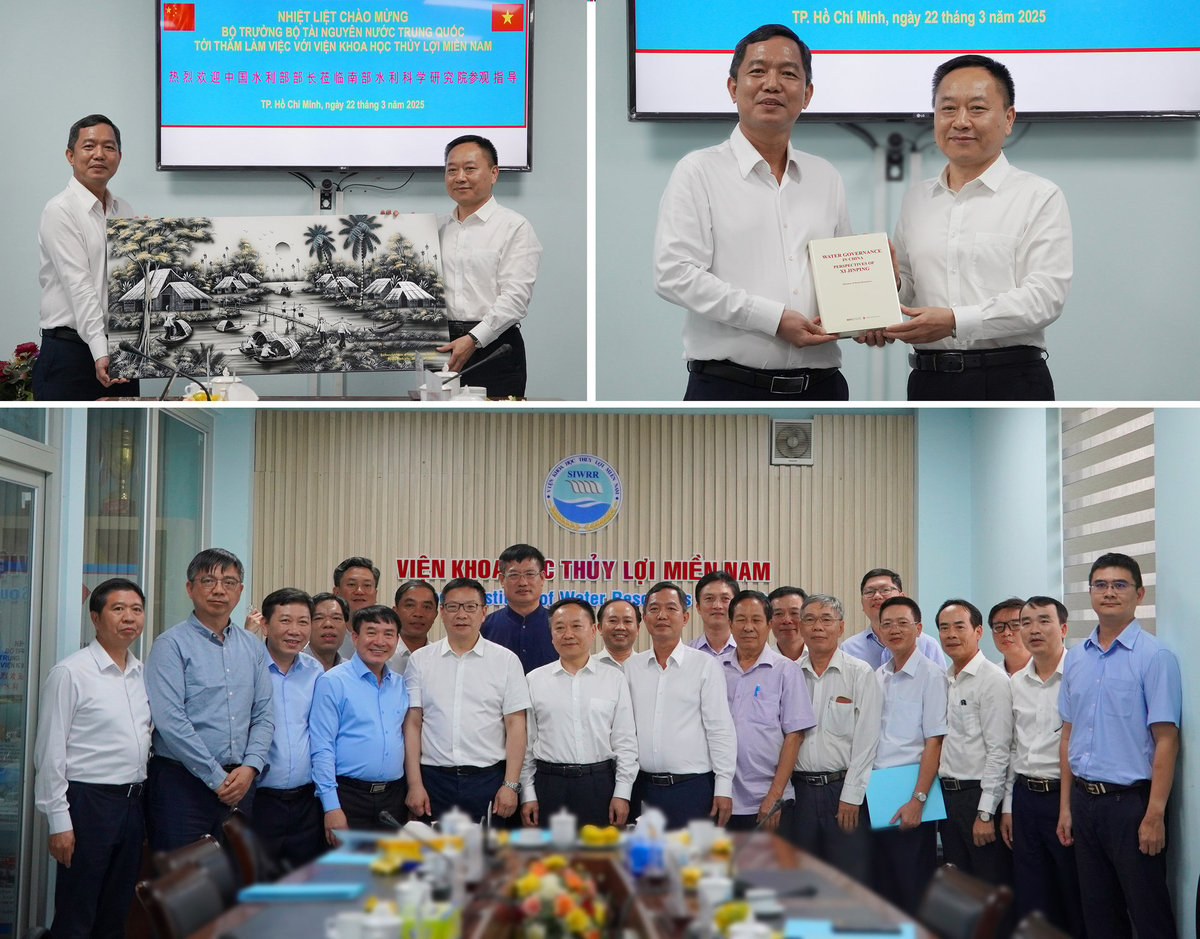
Both sides exchanged gifts and took commemorative photos. Photo: Nguyen Thuy.
As part of the working trip, Minister Li Guoying's delegation visited the Nguyen Tan Thanh boat lock, a project researched and designed by the Southern Institute of Water Resources Science and Technology. The facility is currently operating effectively in controlling water resources and preventing saltwater intrusion in the region.
Translated by Kieu Chi

(VAN) Food waste has become a serious issue in modern society, especially in rapidly urbanizing and developing cities like Hanoi.
![Multi-channel, multi-directional Vietnamese agricultural markets: [7] Deep processing makes global reach easy](https://t.ex-cdn.com/nongnghiepmoitruong.vn/608w/files/huytd/2025/05/16/2946-che-bien-sau-chia-khoa-vang-nang-tam-nong-san-viet-tren-ban-do-the-gioi-080603_110-093858.jpg)
(VAN) The application of deep processing technology is helping Vietnamese agricultural products enhance their value, create competitive advantages, and open doors to conquer global consumers.
![Multi-channel, multi-directional Vietnamese agricultural markets: [6] Agri products go online](https://t.ex-cdn.com/nongnghiepmoitruong.vn/608w/files/content/2024/12/10/1-113313_954.jpg)
(VAN) Bringing agri products onto e-commerce platforms is an effective way to build a brand that many businesses, cooperatives, and agricultural production households are doing.

(VAN) Veterinary training should focus on quality, not just quantity. Veterinarians also need more options to pursue specialized training.

(VAN) The veterinary industry needs to be viewed objectively and further invested in to properly demonstrate its role and importance in the new context.

(VAN) The number of veterinarians graduating each year is not enough to meet actual needs, hence a difficult problem for the growing livestock industry.

(VAN) The strategic partnership between Cambodia, the Philippines, Vietnam, and CGIAR ensures that innovative solutions effectively address national priorities for food system development.